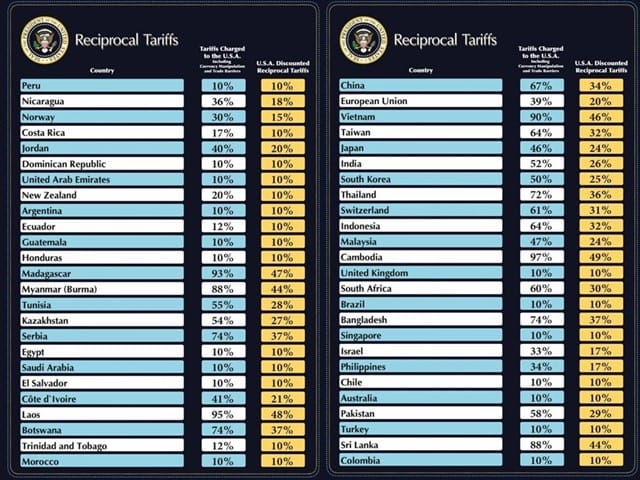Donald Trump has announced a sweeping package of tariffs that will reshape global trade. Starting April 5, the US will impose tariffs ranging from 10% to 49% on imports from several countries. The auto industry, especially in Canada, faces immediate challenges due to a 25% tariff on vehicles. This bold move will impact trade relations worldwide. Let’s break down the key points.
What Trump’s Tariffs Mean for Global Trade
Trump’s new tariffs are part of his “Liberation Day” initiative. He aims to address the US trade deficit and strengthen national security. The US will charge a 10% tariff on all countries. However, Trump will impose higher rates on countries he sees as “worst offenders.”
25% Tariff on Imported Vehicles: Impact on the Auto Industry
One of the most significant changes is the 25% tariff on vehicles. This decision will deeply affect Canada’s automotive sector. Over 500,000 workers in Canada face job losses as a result. The US and Canada’s integrated auto industries mean this move will hurt both nations. Experts predict mass layoffs within one week.
Canada’s Trade Dilemma
Canada exports over a million vehicles to the US each year. Although Canada isn’t on the highest tariff list, its auto industry will be severely impacted. Car orders are already dropping, and businesses are cutting jobs due to fewer parts needed. The situation could worsen if the US continues to push tariffs related to issues like fentanyl and migration.
Tariffs on Other Nations

Countries facing higher tariffs include:
- China: 34% tariff (total of 54% with existing tariffs).
- EU: 20% tariff.
- India: 26% tariff.
- Japan: 24% tariff.
- UK: 10% tariff (one of the lowest among the targeted nations).
Trump insists the tariffs are about fair trade practices. He believes the US deserves equal treatment from its trading partners.
The UK’s Response: Will the 10% Tariff Hurt the Economy?
The UK will face a 10% tariff on imports. While this is lower than other nations, UK officials remain cautious. They aim to negotiate a balanced deal with the US to lower these tariffs further. The UK government continues to push for a long-term solution that protects its businesses.
Impact on Global Economies: A Wake-Up Call
Trump’s tariffs are more than just economic policies. They are also a political statement. The announcement has created uncertainty in global trade. Countries like Canada and the EU are preparing for the impact. While the UK is better off with a 10% tariff, the global trade environment will change significantly.
What’s Next for Global Trade?
The tariffs will take effect in two stages. On April 5, the US will impose a 10% baseline tariff on all countries. On April 9, the US will introduce higher tariffs on the “worst offenders.” Trump’s tariffs reflect his broader strategy to address trade imbalances, especially with China and the EU.



